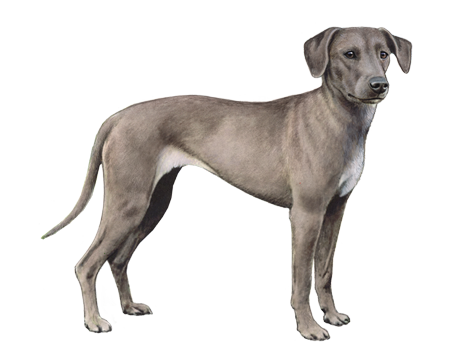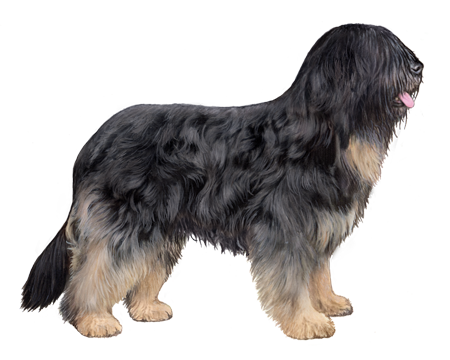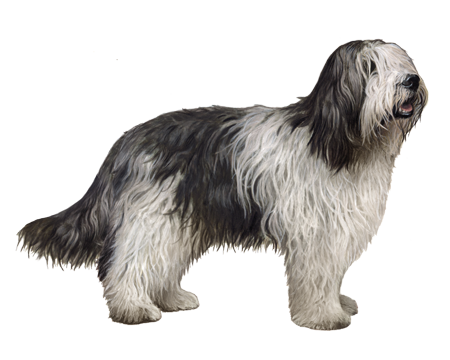
Shiloh Shepherd Dog
The Shiloh Shepherd is an intelligent, gentle, people-oriented dog breed. These playful, loving pups are always happy to be included in family activities.
Interested in discovering if your dog is a Shiloh Shepherd Dog?
Check out Wisdom Panel's DNA tests.

Shiloh Shepherd Dog Traits
General Appearance
Shiloh Shepherds are large, muscular dogs with noble expressions. They have a balanced, athletic build that exudes power and elegance.
Coat and Coloring
Shilohs come in two coat varieties: smooth and plush. Smooth-coated dogs have a thick, harsh double coat that lies close to the body. And the back of the legs has longer hair than the rest of the body. The plush coats, on the other hand, are not as coarse but still somewhat harsh. These dogs also have softer undercoats, longer manes, and pronounced feathering on the head, back of legs, and tail.
The Shiloh's coat comes in various colors—including shades of black with tan, golden tan, reddish tan, silver, and cream. Some Shilohs have a white blaze on the chest or white markings on the toes.
Distinctive Physical Traits
The Shiloh's key features include a broad, noble head and stocky body with emphasis on efficient movement. This breed also has a well-developed jaw, wide and deep chest, straight back, full, bushy tail that hangs like a saber when relaxed, almond-shaped eyes, and erect, triangular ears.
Shiloh Shepherd Dog Temperament
The Shiloh's gentle, steady temperament makes this breed an excellent option for families. Shilohs have friendly personalities and get along well with other pets and children.
The Shiloh's gentle, steady temperament makes this breed an excellent option for families. Shilohs have friendly personalities and get along well with other pets and children.
They love to work, play, and spend time with their people. But as such a social breed, they don't like being alone for long periods. Their calm nature makes Shilohs great candidates for therapy and service dog work.


Shiloh Shepherd Dog History
The origin of the Shiloh Shepherd Dog can be traced to Tina Barber, who made her first outcross in 1991 in New York. Inspired by the size, temperament, and intelligence of the German Shepherds her grandmother bred, Tina set out to create her ideal shepherd.
Through extensive selective breeding, Tina's shepherds departed from the modern German Shepherd standard. They were larger with straight backs and gentle, stable temperaments. Tina first outcrossed her German shepherd dogs with a German Shepherd dog, Malamute, White Shepherd line bred for an American television show. She also introduced working Czech German Shepherd Dogs and dogs widely believed to have Altdeutscher Schäferhunde, Czechoslovakian Vlcak, and Sarplaninac lineage. These introductions allowed Tina to hone key features of the Shiloh while preserving the overall health of the gene pool.
The American Rare Breed Association (ARBA) first recognized the newly-founded breed. But today, the Shiloh remains relatively rare and has yet to gain recognition from major international breed registries.
Shiloh Shepherd Dog Care
Nutrition
Shiloh Shepherds thrive on a high-quality diet that's appropriate for their life stage (e.g., puppy, adult, senior). They also benefit from foods formulated for large breeds—particularly when they're puppies. This helps prevent them from growing too fast and developing hip dysplasia as they age.
Because of their deep chests, these dogs are at a greater risk of bloat (also known as twisted stomach). To help prevent bloat, break your dog's food up into several meals a day, and use a food bowl designed to slow their eating. Also, avoid feeding immediately before or after any kind of vigorous activity. These are just a few ways you can help prevent this life-threatening condition. Consult your veterinarian about other methods, including surgical options.
Shiloh Shepherds thrive on a high-quality diet that's appropriate for their life stage (e.g., puppy, adult, senior). They also benefit from foods formulated for large breeds—particularly when they're puppies. This helps prevent them from growing too fast and developing hip dysplasia as they age.
Because of their deep chests, these dogs are at a greater risk of bloat (also known as twisted stomach). To help prevent bloat, break your dog's food up into several meals a day, and use a food bowl designed to slow their eating. Also, avoid feeding immediately before or after any kind of vigorous activity. These are just a few ways you can help prevent this life-threatening condition. Consult your veterinarian about other methods, including surgical options.
To keep your Shiloh at a healthy weight, monitor their food intake and measure portions to avoid overfeeding. And remember, treats should make up no more than 10% of their daily calories.
Grooming
The Shiloh's double coat needs brushing a few times a week to look its finest. Smooth-coated dogs shed continuously, whereas plush-coated dogs shed very little for most of the year. But both varieties blow their coats twice annually. During these periods of increased shedding, brushing more frequently is wise.
Regular nail trims should also be part of your pup's grooming routine. Nails that get too long can cause pain and potentially lead to running or walking problems. Lastly, to guard against dental disease, be sure to brush your dog's teeth often.
Exercise
Shilohs are athletic, intelligent dogs that need physical and mental exercise every day. Long walks, hikes, and backyard play sessions are great ways for them to burn off energy. They also enjoy dog sports—such as obedience, search and rescue, agility, and herding—that allow them to work out their bodies and minds.
Training
If you let them, your Shiloh will happily take on the role of pack leader. Use gentle but firm training techniques with this smart breed to establish ground rules from an early age. Puppy socialization is also essential to help your pup develop into a well-mannered adult dog.

Breed Group
Herding
The herding group is a diverse category. These highly intelligent breeds were developed to guard and control the movement of livestock.























































